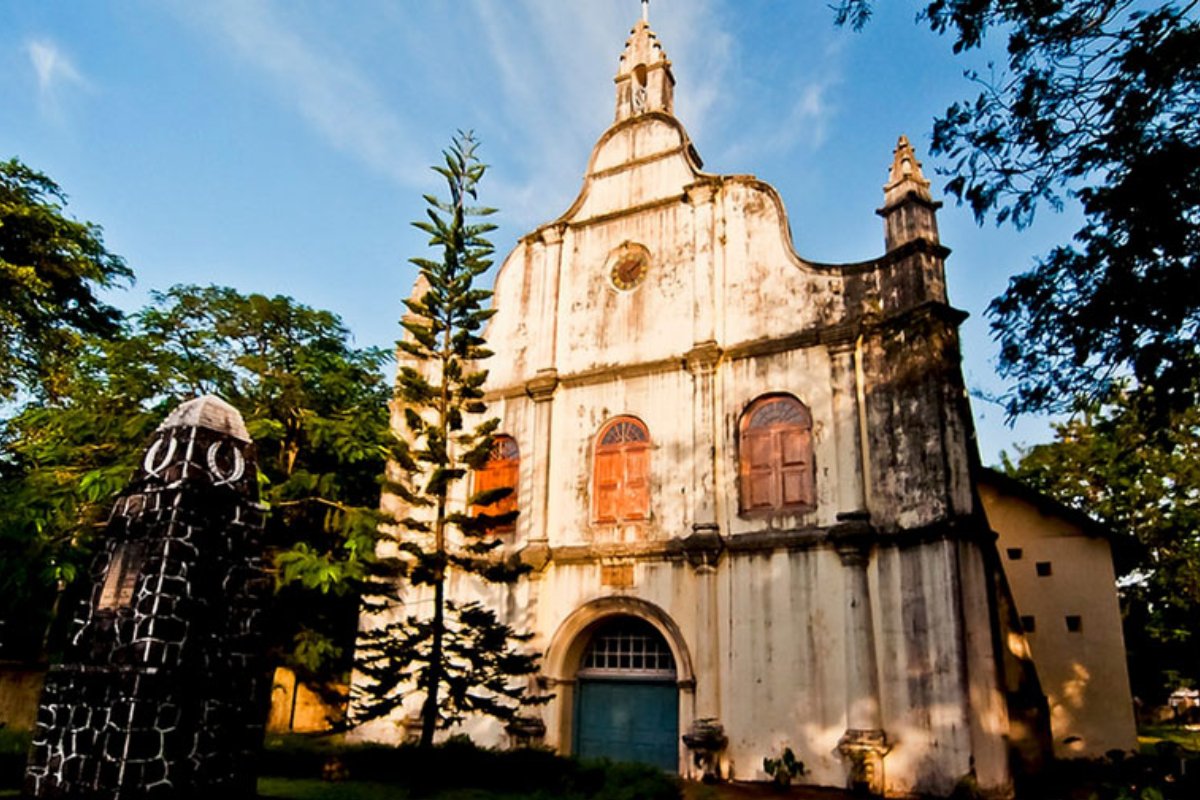Indian attitudes toward religion can sometimes be innocently ironic – and heartwarming. At 5 pm three days before Christmas, I saw a tour guide urging a large group of Bengalis to ‘darshan koro’ quickly, before the gate of Kochi’s oldest church, dedicated to St Francis, shut for the day.
They rushed in, shepherding children, while the church bearer (at least he would have been called that during the Raj) resignedly held the gate half-shut. A Hindu himself, albeit from Kerala, he understood this religiosity.
His behaviour was a lesson in culture – a contrast to the way a gowned official shut a church door in my face after, new in town, I finally found the site for a world-renowned choir’s performance at one of England’s famous university towns.
The choir was just beginning to sing, but (apart perhaps from my skin colour) I would have intruded no more than the individual (whose gown was probably meant to signify education) would while taking her seat.
The tightly scraped rhythms of what the two Cambridge choirs performed contrast with the music of most equatorial regions. As was evident later that evening in the riffs (and the jamming with a mridangam and a khanjira) when a violinist played Carnatic music at Kochi’s Kathakali centre, around the corner from the Roman Catholic basilica, which now vies for importance with St Francis church, half a kilometre away.
The desire for ‘darshan’ (viewing a god for devotion or prayers), irrespective of faith tradition, was not just a contrast. It was deeply ironic, for rival colonial powers have contested this church for centuries, riven by doctrinal, political, and geopolitical differences. Along the way, the church walls, built and destroyed several times, have seen a lot—from the burial of Vasco da Gama to a visit by Queen Elizabeth II.
It began as a Portuguese church but must have been shorn of statues, including those of Mother Mary, and other signs of Catholicism when the Dutch gained dominance in Kochi and brought the staid Reformation to it.
The British took over at the beginning of the 19th century and, after an interregnum of four years during which the commanding officer conducted weddings and funerals, an Anglican priest took over. In 1947, St Francis Church became the property of the Church of South India.
It is said that it once commemorated the saint of Assisi, but the name could well refer to St Francis Xavier, that powerful figure of the Counter-Reformation, whose relics lie in Goa. In which case, it is taken over as a bastion of the Reformed would be more ironic.
Inclusive religiosity
The Bengali visitors probably had no idea, and little interest, in the history of tussles over the church – tussles over doctrines that deeply influenced society, economics, politics, and geopolitics halfway across the world.
They were far more in tune with the inclusive religiosity of Kerala –and, more generally, the traditions of the Indian subcontinent.
A Muslim diligently helps one find a vegetarian eating place in Kerala – a restaurant where one sees a statue of Mary garlanded with a rosary at one end of a series of Hindu idols and deities’ pictures. A youth warmly invites one to an Orthodox Church to hear the choir practising for a concert of carols, without asking about one’s religion or sect. A Muslim restaurant has Christmas decorations, and many shops have shelves full of Christmas cakes.
Jews remained safe here
Hardly any Jews remain near Kochi’s Pardesi synagogue, but hundreds of people daily visit this symbol of how Jews have been welcome, and safe, in India for thousands of years.
As the name suggests, this synagogue was built for Ashkenazi (white) Jews who came there only about five centuries ago, during the Spanish Inquisition, but Jews have found safe refuge there since their dispersal from Palestine in 70 AD – and, according to legend, since the days of King Solomon, thanks to trade, or even of Nebuchadnazar, owing to expulsion.
The Ashkenazis kept apart, apparently viewing the long-established, darker-skinned Jews of the Cochin area with a touch of derision. King Charles visited the Pardesi Synagogue when he was the Prince of Wales.
The synagogue’s wall abuts a major temple, and it is surrounded by shops and restaurants owned by people of other faiths. One sees temples and churches all over Kerala, and black-clad Sabarimala pilgrims are integral to the landscape.
Inclusive carols and prayers
A few days before Christmas, one had attended a dinner related to a wedding. The two Christian families sang Tamil and Telugu songs and carols before dinner was served at this Tamil home in Trivandrum. At one point, there was a call for a Hindi carol, and those among the gathered south Indians could join to sing the song.
At the engagement, the priest went out of his way to use inclusive, universal terms for God. Not that the bride and groom were from different religions, but some of their close friends attending the function were.
It is a spirit that harks back to the teachings of Jesus before his message was interpreted by organised religion – like the message of many others of those whose teachings have become the core of one or another religion.
It was in tune with those Bengali tourists in search of a darshan that might possibly lead to the betterment or – who knows – eternal moksh.
David Devadas is a journalist and security, politics and geopolitics analyst.
Disclaimer: Views expressed above are the author’s own

